Exhibitions
We have five exhibitions available to the public.
Click on the FR or NL square at the top right of the page to access the exhibition pages in French or in Dutch.
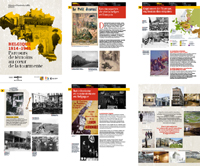 Belgium 1914-1945: Witnesses at the heart of the turmoil
Belgium 1914-1945: Witnesses at the heart of the turmoil
This exhibition covers the period from the First World War to the liberation of the camps and the return of the deportees between 1944 and 1946. In addition to the historical and cultural levels, the exhibition is accompanied throughout by a testimonial level that retraces the life paths of people who have given testimony to our Foundation. (available in French and in Dutch)
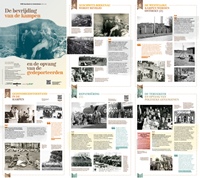 The liberation of the camps and the return of the deportees
The liberation of the camps and the return of the deportees
This exhibition first describes the conditions under which the SS evacuated the camps (the death marches) following the Allied advance. After discussing the first liberation of camps in the East (Majdanek, Auschwitz) and the discovery of mass murder, several panels describe the circumstances in which the liberation and discovery of camps in the West took place. (available in French and in Dutch)
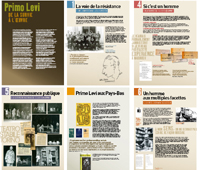 Primo Levi. From Survival to Oeuvre
Primo Levi. From Survival to Oeuvre
This exhibition on Primo Levi provides the public with a unique iconographic and documentary background. Designed to appeal to everyone, Primo Levi. From Survival to Oeuvre introduces us to one of the great witnesses of our time, a survivor of Auschwitz, by combining his biography with the oeuvre he has left us. (available in French, in Dutch and in German)
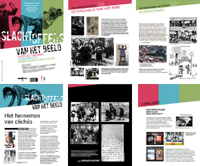 Victims of the image. The Making, Reworking & Critique of Clichés
Victims of the image. The Making, Reworking & Critique of Clichés
Victims of war, natural disasters, epidemics... Civilian victims have invaded our daily lives for half a century. We see them in newspapers, on television, on posters in the street, in the underground. They have become somewhat banal, sometimes having the opposite effect. (available in French and in Dutch)
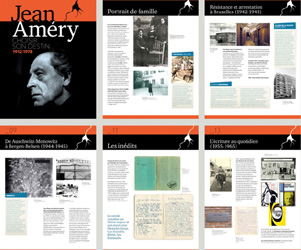 Jean Améry. Choose your destiny. 1912-1978
Jean Améry. Choose your destiny. 1912-1978
This exhibition deals with the oeuvre and career of the writer Jean Améry. His real name was Hans Mayer, an Austrian of Jewish origin, who went into exile in Belgium in 1938. During the war, he joined the resistance. Arrested in July 1943 and deported to Auschwitz, he survived and returned to live in Brussels. Jean Améry knows how to evoke philosophical and literary reflection on the Nazi terror, the genocide of the Jews and the violence of the 20th century. (available in French and in Dutch)
Click on the FR or NL square at the top right of the page to access the exhibition pages in French or in Dutch.
Contact
Auschwitz Foundation – Remembrance of Auschwitz
Rue aux Laines 17 box 50 – B-1000 Brussels +32 (0)2 512 79 98
+32 (0)2 512 79 98 info@auschwitz.be
info@auschwitz.be
BCE/KBO Auschwitz Foundation: 0876787354
BCE/KBO Remembrance of Auschwitz: 0420667323
Office open from Monday to Friday 9:30am to 4:30pm.
Visit only by appointment.
![]()
![]()
![]()
![]()
![]()
Become a member
To become a member of Remembrance of Auschwitz ASBL, please contact us and transfer the sum of €50.00 to our account IBAN: BE55 3100 7805 1744 – BIC: BBRUBEBB with the communication: ‘Membership fee 2025’. The membership includes two issues of 2025 of our scientific journal.
DONATIONS
Donations of €40.00 or more (in one or more instalments) qualify for tax exemption for Belgian taxpayers.
In communication, please specify that it is a ‘Donation’ and mention your National Number which is required since 2024 to benefit from the tax exemption.
Subscribe
Error : Please select some lists in your AcyMailing module configuration for the field "Automatically subscribe to" and make sure the selected lists are enabled

